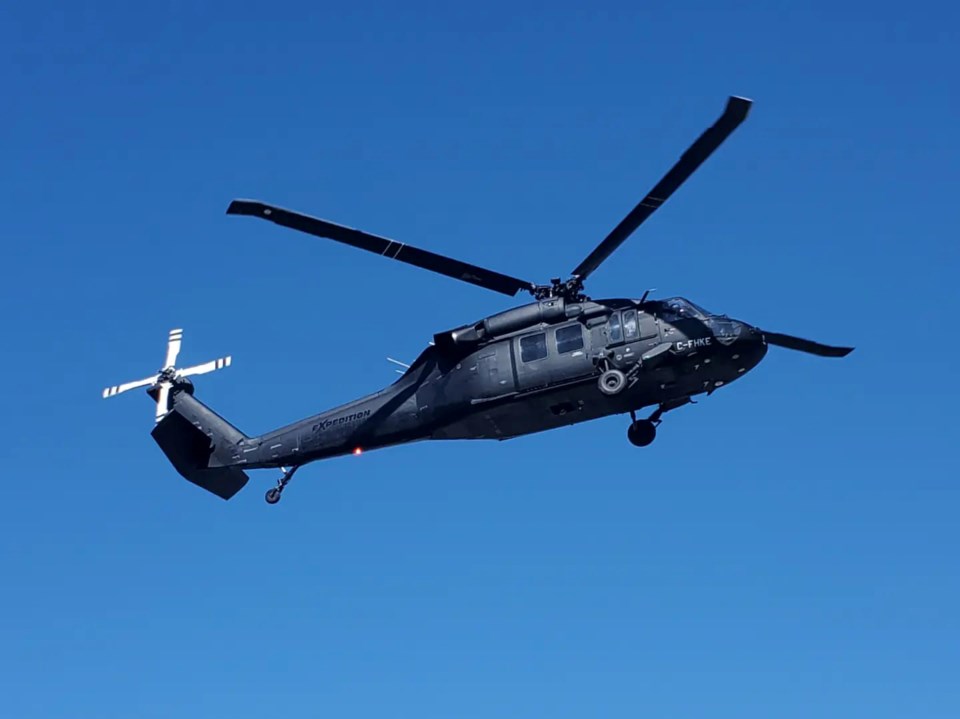COCHRANE - After recently adding a Black Hawk helicopter to its fleet, a Northern Ontario company is already chopping down forest fires across Canada.
Expedition Helicopters, located in Cochrane, purchased a former U.S. military helicopter which is currently being used to fight forest fires in Quebec. It is the third helicopter of its kind to operate in Canada.
“A typical helicopter that we would see in the civilian market would have an average cruise speed of anywhere between 100 to 120 knots. The Black Hawk has an average cruise speed of about 150 to 160 knots,” Todd Calaiezzi, president of Expedition Helicopters, told TimminsToday.
“The faster we get to the fire, the better chance we have of containing it and putting it out. So, we could potentially prevent a fire from becoming out of control. There's also huge cost savings to the province if they can contain the fire prior to having to action it with 200 or 300 firefighters.”
Not only does the UH-60 Black Hawk have more speed than standard helicopters used to fight forest fires in Canada, Calaiezzi said it can also carry nearly three times more water.
“The Black Hawk can carry a crew of eight firefighters instead of four, so two teams worth, all of their gear, and our bucket all at the same time,” he said.
“Our bucket size is 900 gallons versus 340 gallons. So, we have almost three times the capacity for water. You know, a typical Bell 205, Bell 212, or Bell 412 would have somewhere in the range of 3,000 pounds of water that it could drop where we're going to be dropping 8,000 to 9,000 pounds.”
The company’s new addition will also be a game-changer in terms of search and rescue missions across Ontario, Calaiezzi said.
“It's night vision ready. We purchased it and equipped it for night flight with night vision goggles. To that point, it makes it a new and more improved tool, if you will, for search and rescue missions,” he said.
The Black Hawk is currently being used to fight forest fires in Quebec, Calaiezzi said.
“They're actively out supporting fire suppression. There're a number of fires that they're servicing and supporting right now,” he said.
Designed to quickly transport personnel in and out of combat zones, the UH-60 Black Hawk helicopter was developed by Sikorsky Helicopters in the 1970s for the U.S. Army. They were made famous in 2001's Black Hawk Down.
The U.S. military has started replacing their older Black Hawk models. The older models get put into government surplus auctions. According to Calaiezzi he bought the helicopter through a purchasing agent in the U.S. He said they’ve been trying to get a Black Hawk into Canada for about five years.
“It took us a year-and-a-half from the date of purchase to get it delivered. But there were some glitches along the way as well,” he said.
A new Black Hawk is worth about $70 million, Calaiezzi said. Depending on the model, a decommissioned Black Hawk can cost anywhere from $1 million to $1.5 million, but by the time it’s demilitarized and ready to work in a civilian marketplace, he said it can cost anywhere from $4 million to $4.5 million.
About a week after receiving the Black Hawk, Calaiezzi said Transport Canada sent out operating conditions restricting them from putting people on board. Currently they’re only able to use it for water bombing or for infrastructure purposes.
“Some regions are very much in support of the Black Hawk and some are dead set against it. So it's been very, very challenging from that aspect of it. It’s alarming and disturbing that the government has imposed the restrictions they have on these aircraft for no reason,” he said.
“This aircraft is the aircraft of choice for moving valuable soldiers. They're not only humans, but they're a huge asset. They're going to want the best piece of equipment available to them to bring their people to the frontlines. That's what this aircraft is. And we're fortunate enough to have it in our hands in this country. Our Canadian military doesn't even own one.”
Calaiezzi, who was born and raised in Cochrane, established Expedition Helicopters at the age of 24 on May 19, 1999. The company now employs about 170 people.
“It's been a long journey but a good journey. For me, it's a legacy. When I leave the industry, I'll be able to say that I changed firefighting in this country.”
